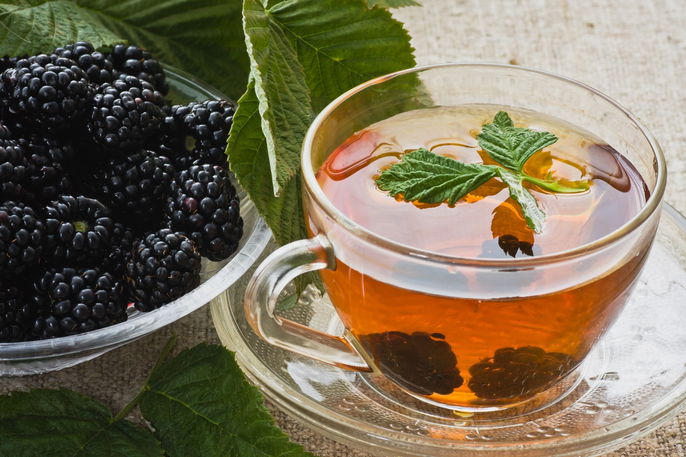Mulberry tea can be consumed to relieve menopause symptoms, manage high blood pressure and prevent diabetes. It can also boost immunity, treat diarrhe and promote weight loss.
These benefits are possible because mulberry tea is rich in flavonoids, tannins and 1-deoxynojirimycin, which are compounds that contain antioxidant, hypoglycemic, antimicrobial and astringent properties.
Mulberry tea can be made with the leaves, stems and roots of mulberry plants. There are several varieties available, like blackberry plants (Morus nigra L.), white mulberry plants (Morus alba L.); and red mulberry plants (Rubus rosifolius Sm).

Health benefits
Mulberry tea can provide many health benefits such as:
1. Relieving menopause symptoms
Mulberry tea, especially if it is made from blackberry plants, is rich in flavonoids, flavones and isoflavones. These are phenolic compounds that help to regulate estrogen levels in the body and relieve menopause symptoms, such as mood swings, hot flashes and insomnia.
Also recommended: 13 Natural Remedies for Menopause Symptoms tuasaude.com/en/natural-remedies-for-menopause2. Managing high blood pressure
Because it is rich in tannins, which are phenolic compounds with antioxidant and anti-inflammatory action, mulberry tea can help to promote optimal artery health and prevent the formation of fatty plaques. It can facilitate blood circulation and help to control high blood pressure.
However, mulberry tea should not replace any medications prescribed by your doctor and should only be used to complement you medical treatment.
3. Preventing diabetes
Mulberry tea protects the pancreas from damage caused by free radicals and can improve how insulin works in your body. This can contribute to normal blood sugar levels and prevent insulin resistance and diabetes.
In addition, mulberry tea also contains 1-deoxynojirimycin. This is bioactive compound that decreases carbohydrate absorption in the intestines, which can help keep blood sugar levels under control.
4. Preventing heart disease
Because it has powerful antioxidant action, mulberry tea prevents the oxidation of fat cells, which can help to control the levels of LDL cholesterol and triglycerides in the blood. Normal lipid levels can reduce the risk for cardiovascular diseases, like a stroke, heart attack or atherosclerosis.
5. Treating infections
Mulberry tea contains anthocyanins and tannins, which are compounds with antimicrobial action. They help to fight bacteria like Escherichia coli and Staphylococcus aureus, and can treat infections that cause gingivitis or a sore throat.
6. Fighting diarrhea
Mulberry tea can treat diarrhea, because it contains bioactive compounds with anti-inflammatory and astringent action. The flavonoids and tannins that are found in its composition help to reduce intestinal inflammation.
7. Boosting immunity
The large amounts of flavonoids and tannins present in mulberry tea can help fight free radicals and stimulate the release of defense cells. This can lead to a strengthened immune system that can adequately fight-off any viruses, bacteria and fungi.
Does mulberry tea help for weight loss?
Mulberry tea contains 1-deoxynojirimycin, a bioactive compound that blocks the enzyme that digests carbohydrates in the intestine. This can play a role in reducing calorie absorption, which can promote weight loss.
However, to lose weight, mulberry tea must be included in a healthy diet, associated with regular physical exercise.
Furthermore, more studies on humans are still needed to prove the benefits of mulberry tea for weight loss.
How to make mulberry tea
Mulberry tea can be made using the leaves (fresh or dried), stem or roots of this plant.
Ingredients:
- 1 teaspoon of fresh mulberry leaves
- 200 ml of water
Directions:
Pour the water into a pot and boil. Then remove from heat, add the mulberry leaves, cover the pot and infuse for 5 minutes. Strain and drink. You can drink up to 3 cups of this tea per day.
Possible side effects
Although mulberry tea is generally safe, excessive intake can cause side effects such as nausea, dizziness, diarrhea, or constipation.
Contraindications for use
Children, pregnant women or breastfeeding women should avoid mulberry tea, as there are not enough studies available on the safety of consuming this tea in these populations.
Furthermore, people with hypoglycemia or who take medications for diabetes or high blood pressure should consult a doctor or medicinal plant specialist before drinking this tea.






























